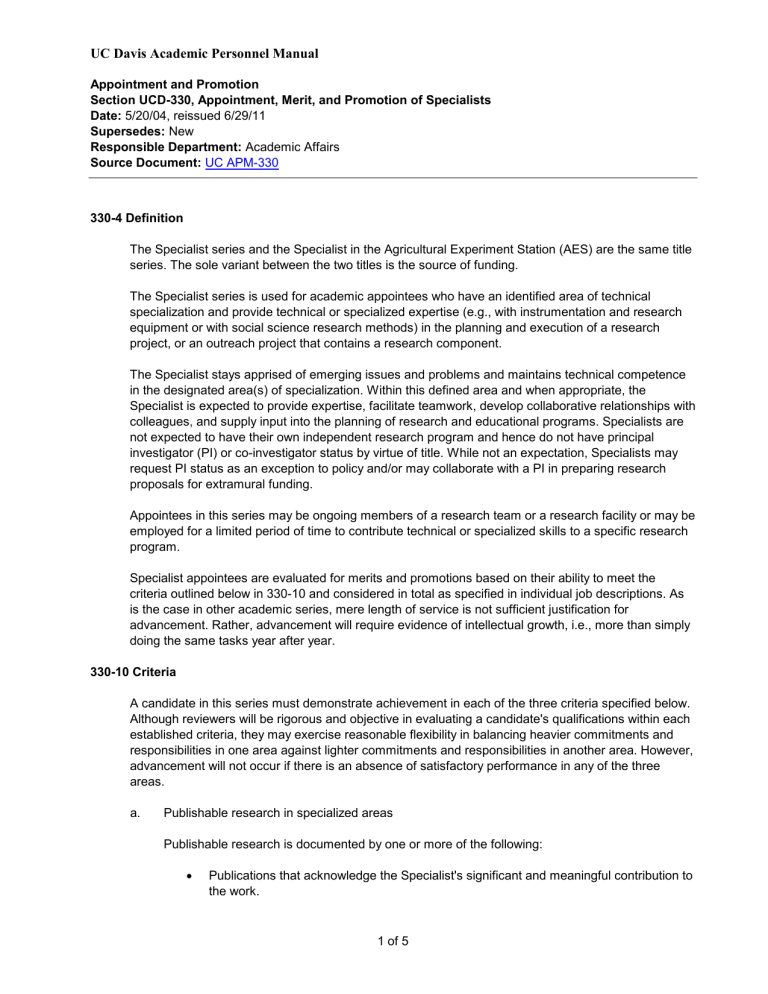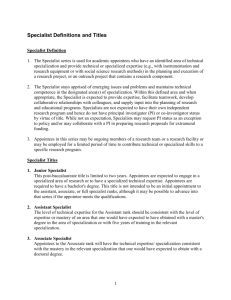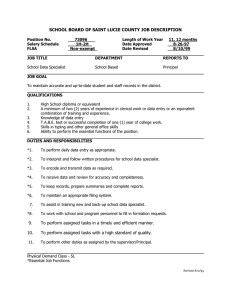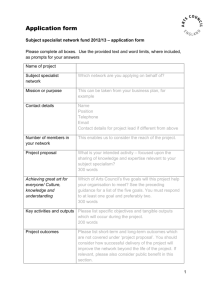UC Davis Academic Personnel Manual

UC Davis Academic Personnel Manual
Appointment and Promotion
Section UCD-330, Appointment, Merit, and Promotion of Specialists
Date: 5/20/04, reissued 6/29/11
Supersedes: New
Responsible Department: Academic Affairs
Source Document: UC APM-330
330-4 Definition
The Specialist series and the Specialist in the Agricultural Experiment Station (AES) are the same title series. The sole variant between the two titles is the source of funding.
The Specialist series is used for academic appointees who have an identified area of technical specialization and provide technical or specialized expertise (e.g., with instrumentation and research equipment or with social science research methods) in the planning and execution of a research project, or an outreach project that contains a research component.
The Specialist stays apprised of emerging issues and problems and maintains technical competence in the designated area(s) of specialization. Within this defined area and when appropriate, the
Specialist is expected to provide expertise, facilitate teamwork, develop collaborative relationships with colleagues, and supply input into the planning of research and educational programs. Specialists are not expected to have their own independent research program and hence do not have principal investigator (PI) or co-investigator status by virtue of title. While not an expectation, Specialists may request PI status as an exception to policy and/or may collaborate with a PI in preparing research proposals for extramural funding.
Appointees in this series may be ongoing members of a research team or a research facility or may be employed for a limited period of time to contribute technical or specialized skills to a specific research program.
Specialist appointees are evaluated for merits and promotions based on their ability to meet the criteria outlined below in 330-10 and considered in total as specified in individual job descriptions. As is the case in other academic series, mere length of service is not sufficient justification for advancement. Rather, advancement will require evidence of intellectual growth, i.e., more than simply doing the same tasks year after year.
330-10 Criteria
A candidate in this series must demonstrate achievement in each of the three criteria specified below.
Although reviewers will be rigorous and objective in evaluating a candidate's qualifications within each established criteria, they may exercise reasonable flexibility in balancing heavier commitments and responsibilities in one area against lighter commitments and responsibilities in another area. However, advancement will not occur if there is an absence of satisfactory performance in any of the three areas. a. Publishable research in specialized areas
Publishable research is documented by one or more of the following:
•
Publications that acknowledge the Specialist's significant and meaningful contribution to the work.
1 of 5
APM UCD-330
5/20/04, reissued 6/29/11
•
Publications on which the Specialist is an author.
•
Other evidence (e.g., letters from collaborators or principal investigators) that work done by the Specialist contributed to publishable research.
•
Active dissemination of information (beyond the boundaries of the campus) through informal instruction, presentations, or other means stemming from the Specialist's research accomplishments.
•
Other evidence of recognized expertise may include formal documentation of intellectual effort and participation in publishable research activities, first authorship on publications/patents, presentation of research at regional/national meetings, invitations to review grant proposals and/or journal articles, invitations to participate in research projects, and/or service on advisory panels.
Research publications and other creative accomplishments will be evaluated, not merely enumerated. There should be evidence that the candidate is continuously and effectively engaged in research activity of scholarly quality and significance within the defined area of expertise and specialization, recognizing that the Specialist is not expected to have his/her own independent research program. b. Professional competence and activity
Specialists are expected to engage in professional activities that are directly related to their professional expertise and achievement. The Specialist's professional activities will be scrutinized for evidence of achievement and leadership in their field of expertise and for demonstrated progressiveness in the development or utilization of new approaches and techniques for the solution of professional problems.
Such activities may include:
•
Participating in appropriate professional/technical societies or groups and other educational and research organizations.
•
Reviewing research proposals.
•
Reviewing journal manuscripts and other publications related to his/her area of expertise. c. University and public service
Specialists, as academic appointees, play an important role in the function of the University.
Consideration should therefore be given to whether candidates for this series are likely to participate effectively in University committees and in achieving departmental, college/school/divisional, and University missions. The departmental position description should include a description of the type of service that will be expected of the candidate. Local, regional, state, national, and international service will be evaluated for higher-level appointments/advancements. Such service may be in the candidate's area of expertise or in other areas if the work done is at a sufficiently high level or of sufficiently high quality.
Specialists are evaluated on both the amount and the quality of their service when such service is appropriate. Service activities may be at the level of the department, the
2 of 5
APM UCD-330
5/20/04, reissued 6/29/11 college/school/division, the campus, the University, and/or the public, with particular attention to service that is directly related to their professional expertise and achievement. Specialists may maintain liaison and respond to the needs of various industry organizations, state and federal agencies, and other external groups on issues related to the area of expertise.
Expectation of University and public service must be in agreement with expectations/restrictions specified by the candidate's funding source.
330-11 Ranks within series
The initial rank (assistant, associate, full specialist) of an appointee to the Specialist series is dictated by the specialization and experience of the candidate, the complexity of the research for which the candidate will be responsible, the level of independence with which the candidate will work (working independently does not mean that the candidate has an independent program), and the specialized research duties the candidate will assume.
As an academic appointee, advancement is based on individual qualifications and meritorious performance/scholarly achievement and is not automatic or based on length of service. Advancement through the ranks requires measurable growth in the candidate's research efforts/activity with respect to quality, productivity, scope, reputation, and impact within the research field.
The following educational and experiential backgrounds are general guidelines for each of the corresponding ranks. a. Appointments
Appointment levels reflect the candidate's expertise in the given specialty.
1) Assistant Specialist
The level of technical expertise for the Assistant rank should be consistent with the level of expertise or mastery of an area that one would have expected to have obtained with a master's degree in the area of specialization or with five years of training in the relevant specialization.
2) Associate Specialist
Appointees to the Associate rank will have the technical expertise/specialization consistent with the mastery in the relevant specialization that one would have expected to obtain with a doctoral degree.
3) Specialist
Appointees to full title are expected to have the technical expertise and specialization consistent with the mastery that one would have expected to obtain with a doctoral degree plus at least five years of experience in the relevant area of specialization. Specialists at full rank normally are expected to have significantly contributed to publishable research in specialized areas as documented by criteria found in 330-10a and to have achieved professional recognition at or beyond campus level.
3 of 5
APM UCD-330
5/20/04, reissued 6/29/11 b. Advancements
Advancements are based on meritorious performance, scholarly achievement, and continued development in the area of specialization. Promotion to the next rank requires continued professional growth/increased skills in the area of specialization, continuing work resulting in publishable research and other evidence of research productivity, and increased professional recognition.
Candidates at full title are expected to demonstrate significant recognition for their research in specialized areas and professional competency and activities. For advancement above Step III, candidates must demonstrate broad-based recognition (e.g., at the regional, state, or national level) for their expertise in their area of specialization.
Advancement to Specialist, Above Scale, is reserved for Specialists of outstanding, distinguished performance, judged in an arena substantially broader than the particular research program/group with which he or she is associated. Advancement to the Above-Scale level may be justified on the basis of the Specialist's publications, or on his or her own scientific, technical, or otherwise creative contributions (as contrasted to a group effort.)
330-20 Conditions of employment
Conditions of employment and normal evaluation periods applying to appointment to a title in this series are described in APM-330-20 . In addition, appointees at the assistant, associate, and full rank are members of the Academic Federation unless they hold a split appointment in a series that grants membership in the Academic Senate. See Standing Order 105.1(a) of The Regents.
330-21 Junior Specialist
This post-baccalaureate title is limited to two years. Appointees are expected to engage in a specialized area of research or to have a specialized technical expertise. Appointees are required to have a bachelor's degree.
This title is not intended to be an initial appointment to the assistant, associate, or full specialist ranks, although it may be possible to advance into that series if the appointee meets the qualifications.
Appointees to the Junior Specialist title are not members of the Academic Federation.
330-24 Authority a. Authority to approve appointments, reappointments, merit increases, promotions, and terminations in the Specialist series, following appropriate review, rests with the Chancellor.
However, approvals for various actions have been redelegated. b. The department chair or other academic administrative officer who serves or would serve as immediate supervisor of a Specialist has the authority to recommend an appointment, merit increase, or promotion of an individual in the Specialist series after a thorough department review and vote in accordance with the department's approved voting procedures for members of the Academic Federation.
330-80 Checklists, exhibits, and related policies a. Checklists ( http://academicpersonnel.ucdavis.edu/forms/forms.cfm
)
4 of 5
APM UCD-330
5/20/04, reissued 6/29/11
Appointment
Merit
Promotion b. Exhibits
Quick Reference Summary of Academic Research Titles
( http://academicpersonnel.ucdavis.edu/anncall/Summary notes on researcher titles final.doc
)
Comparison Grid of Research Titles c. Related policies
1) APM 140 , Non-Senate Academic Appointees/Grievances .
2) APM 145 , Non-Senate Academic Appointees/Layoff and Involuntary Reduction in Time.
3) APM 150 , Non-Senate Academic Appointees/Corrective Action and Dismissal.
5 of 5






